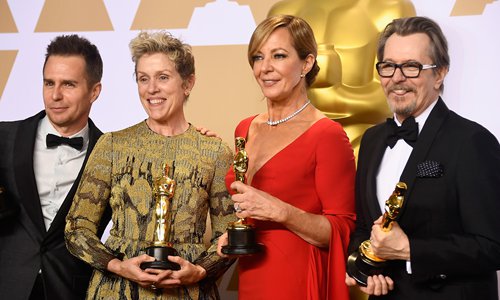
Attendees dressed in cosplay costumes pose at Perfect World's stand during ChinaJoy 2016. (Photo: IC)

Top: From left, best acting Oscar award recipients Sam Rockwell, Frances McDormand, Allison Janney and Gary Oldman pose for photos at the 90th Academy Awards in Los Angeles on March 4.( Photo: VCG)
Beijing-based gaming giant Perfect World seems to be the biggest domestic winner at this year's Academy Awards, with two films it co-produced with Universal Pictures under a slate financing contract - Darkest Hour and Phantom Thread - scooping up three Oscars. Some industry insiders said such cooperation with Hollywood studios provides a shortcut for domestic investors to gain international recognition at the Oscars, while also boosting their credentials and making it easier for them to expand abroad. But others have questioned whether Chinese players can maximize their benefits, as they are not actually involved in movie production under slate financing contracts.
For Chinese film investors, this year marks an Oscar award milestone - Hollywood's highest honor.
At the 90th Academy Awards last week, two movies that Chinese film company Perfect World co-produced with US-based Universal Pictures - Darkest Hour and Phantom Thread - scooped up three Oscars.
Darkest Hour won the award for Best Actor as well as Best Makeup and Hairstyling, while Phantom Thread won the Best Costume Design award. Together, the two films were nominated for 12 awards across nine categories.
The two films are part of a $500 million deal Perfect World reached with Universal Pictures in 2016, a spokesperson for Perfect World told the Global Times on Monday.
Under the deal, Perfect World will co-finance the production of at least 50 films in collaboration with Universal Pictures over five years, with its ratio of fund contribution standing at about 25 percent on average for each movie. In return, Perfect World will gain access to each film's global equities based on its investment ratio, not only in global box-office sales, but also DVD sales, media distribution profits as well as the authorization of movie derivatives.
But Perfect World is certainly not the only domestic investor that is digging for Oscar gold.
Last year, box-office hit La La Land, which was co-financed by Chinese broadcaster Hunan TV and Hollywood producer Lions Gate Film under a $1.5 billion three-year slate financing pact, took home six Oscars.
Zhu Ying, founder of Beijing-based Brand and Entertainment China Group Co, told the Global Times that slate financing has gradually become a common cooperation model between domestic and Hollywood film producers in recent years. She explained that this model involves Chinese investors acting as slate financiers, as opposed to being involved in production, and cherry-picking a specific number of studio films from dozens of pictures.
"Compared with other options such as investing in a single movie or directly acquiring foreign film producers, slate financing is a relatively safe way to recover investment because it spreads the risk across a slew of quality films over a prolonged time," Zhu explained. "It's like putting your eggs in different baskets."
Reaping the benefits
Some analysts noted that for domestic film investors, slate financing, to some extent, maybe a good bargaining model for "mining real gold" and gaining a global reputation at the Oscars, especially at this early stage when Chinese filmmakers are just starting to knock on Hollywood's door.
Such way of investment has provided a shortcut for domestic investors to enter the Oscars world, which has been an elusive prize for Chinese filmmakers, Chen Changye, an independent industry analyst, told the Global Times.
"The Oscar success is a great lift for Chinese investors' credentials and brand value. They have gained footholds in the global movie-making industry and will increasingly become recognized at home and abroad," Chen said. "Also, in the future, they will have more marketable cachets in order to [successfully] negotiate with film producers."
The spokesperson from Perfect World also noted that winning three Oscar statuettes is "a great opening" for the company's expansion in the global movie industry.
"Thanks to the marriages with prestigious Hollywood producers, we can promote the growth of our international business in the future, snap up global shares and acquire big global IP rights," he said, adding that through this experience, Perfect World has also been given the chance to develop a deep understanding of how a typical Hollywood film is prepared, produced, marketed and distributed.
Another rationale behind the ambition to cooperate with Hollywood producers is the rising unpredictability of the domestic box office, Su Mu, a professor at the Beijing Film Academy, told the Global Times over the weekend.
"China's movie sales are like gambling, sometimes, even with mega movie stars and big IP rights, box-office performance is meager. But in Hollywood, where film production and marketing has matured, such thing won't happen," Su noted.
Worth the investment?
However, some analysts have questioned whether Chinese investors can reap maximum profits based on the popular slate financing model.
"The Hollywood movie is like a Boeing aircraft, everyone knows it's good and safe and wants to take the flight… Chinese players are paying to get a ride," Su said.
And because of the strict control over content and copyrights at Hollywood studios, domestic investors won't be able to have a word on movie content and production, analysts noted, with the largest source of revenue likely coming from domestic box-office sales.
But the problem lies in whether Chinese audiences will buy into such Oscar-awarded movies, as most of their favorite genres so far have been literary films targeted at a specific group, Zhu noted. Also, it's worth noting that there is a quota for the number of foreign films allowed to enter the Chinese mainland market every year.
Furthermore, it appears that some of this year's Oscar movies are not big winners at the box office. So far, neither Darkest Hournor Phantom Thread have been big blockbuster hits in the global market. International box-office numbers for each film stood at $136 million and $20.12 million as of the end of February, respectively, according to data from ticketing website Maoyan.
In the domestic market specifically, Darkest Hour, which premiered in December 2017, grossed only 36.96 million yuan ($5.85 million) at the box office, data from industry website 58921.com shows, despite a relatively high rating of 8.7 out of 10 on Chinese media review platform Douban.
However, the Oscars are creating a bunch of opportunities for domestic online video media platforms to capitalize on award-winning movies.
For example, iqiyi.com has acquired the online copyrights of six Oscar movies in China through cooperating with 20th Century Fox Film Corp, according to a statement the company sent to the Global Times on Tuesday.
The company is also considering further cooperation with 20th Century Fox Film Corp in the virtual reality and gaming spheres for the future, the statement noted.


